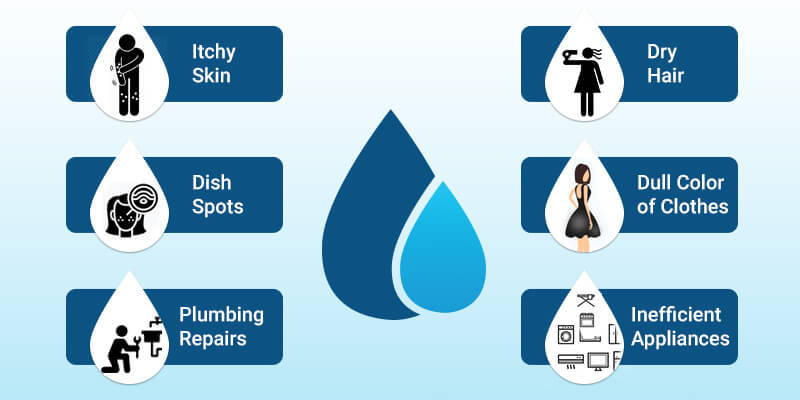The Benefits of Water Softeners
Welcome to our comprehensive guide on the benefits of water softeners. In this article, we will explore the advantages of using water softeners and how they can improve the quality of your daily life.
Improved Water Quality
Water softeners are designed to remove minerals such as calcium and magnesium from hard water, resulting in improved water quality. Hard water can leave mineral deposits on your dishes, glassware, and plumbing fixtures, making them appear dull and dirty. By using a water softener, you can prevent these unsightly mineral deposits and enjoy cleaner, spot-free dishes and fixtures.
Extended Appliance Lifespan
Hard water can hurt your appliances, causing mineral buildup and reducing their lifespan. Appliances such as dishwashers, washing machines, and water heaters are particularly susceptible to damage from hard water. By installing a water softener, you can protect your appliances from mineral buildup, prolonging their lifespan and saving you money in the long run.
Softer and Smoother Skin and Hair
Hard water can leave your skin feeling dry, itchy, and irritated. The minerals in hard water can strip away the natural oils from your skin, leading to dryness and discomfort. Similarly, hard water can make your hair brittle and dull. By using a water softener, you can enjoy softer, smoother skin and hair, as the soft water helps to retain the natural oils and moisture.
Reduced Soap and Detergent Usage
When you have hard water, it can be challenging to get a good lather with soap or detergent. The minerals in hard water react with soap, forming a scum that is difficult to rinse off. This can result in using more soap or detergent than necessary. By using a water softener, you can reduce the amount of soap or detergent needed for cleaning tasks, saving you money and ensuring more effective cleaning.
Energy Efficiency
Water heaters and other appliances that use water are more energy-efficient when operating with soft water. The mineral buildup caused by hard water can reduce the efficiency of these appliances, leading to increased energy consumption. By using a water softener, you can improve the efficiency of your appliances, resulting in energy savings and a reduced carbon footprint.

In conclusion, water softeners offer numerous benefits that can enhance your daily life. From improved water quality and extended appliance lifespan to softer skin and hair, reduced soap usage, and increased energy efficiency, the advantages of using water softeners are undeniable. Invest in a water softener today and experience the transformative effects it can have on your home and well-being.
Frequently Asked Questions
1. What is a water softener?
A water softener is a device that removes minerals, such as calcium and magnesium, from hard water, making it soft and more suitable for various household uses.
2. How does a water softener work?
A water softener typically uses a process called ion exchange to replace the calcium and magnesium ions in hard water with sodium or potassium ions, effectively softening the water.
3. What are the benefits of using a water softener?
Some key benefits of using a water softener include:
Reduced scale buildup on pipes, faucets, and appliances
Softer and smoother skin and hair
Increased lifespan of water-using appliances
Improved efficiency of water heaters
Less soap and detergent usage
4. Can a water softener improve the taste of water?
While a water softener can remove certain minerals that may affect the taste of water, it doesn’t necessarily enhance the taste. The primary purpose of a water softener is to prevent scale buildup and protect appliances.
5. Do water softeners require regular maintenance?
Yes, water softeners require periodic maintenance. This usually involves replenishing the salt or potassium chloride used in the ion exchange process and cleaning or replacing the resin tank.
6. Are there any health concerns associated with softened water?
Softened water is generally safe for consumption and poses no known health risks. However, individuals on a low-sodium diet may want to consider the sodium content in the softened water.
7. Can a water softener remove other impurities from water?
A water softener primarily targets minerals that cause water hardness. To remove other impurities like chemicals, bacteria, or heavy metals, additional water treatment methods such as filtration or purification may be required.
8. How long does a water softener last?
The lifespan of a water softener depends on various factors, including the quality of the unit, water hardness levels, and maintenance. On average, a well-maintained water softener can last around 10 to 15 years.
9. Can I install a water softener myself?
While some individuals may choose to install a water softener themselves, it is recommended to hire a professional plumber or water treatment specialist for proper installation and to ensure optimal performance.
10. Are there any alternatives to water softeners?
Yes, there are alternative methods to address hard water issues, such as using electronic water conditioners, magnetic water treatment devices, or specific filters designed to reduce scale buildup.




